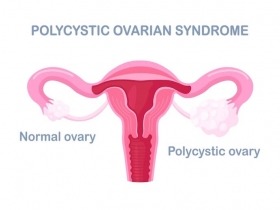Polycystic Ovary Syndrome (PCOS) and Fertility
Polycystic Ovary Syndrome (PCOS) is a common hormonal disorder that affects approximately 10% of women of reproductive age. It is one of the leading causes of infertility in women. PCOS is characterized by an overproduction of androgens, or male hormones, by the ovaries. This hormonal imbalance can lead to a variety of symptoms, including irregular periods, excessive hair growth, acne, and weight gain. However, one of the most significant implications of PCOS is its effect on fertility. (Source: Tommy´s)
Understanding PCOS
PCOS is a complex condition that is not fully understood. It is thought to be caused by a combination of genetic and environmental factors. Women with PCOS often have a mother or sister with the condition, suggesting a genetic link. Additionally, conditions such as insulin resistance and inflammation are commonly found in women with PCOS, indicating a possible environmental trigger. (Source: ScienceDirect) The hormonal imbalance in PCOS leads to the growth of small cysts on the ovaries. These cysts are not harmful, but they can lead to hormonal imbalances that can cause symptoms and affect fertility.
PCOS and Infertility
PCOS is one of the most common causes of female infertility. Women with PCOS often experience irregular menstrual cycles due to the overproduction of androgens. This can interfere with the process of ovulation, making it difficult for these women to conceive naturally. Furthermore, women with PCOS are at a higher risk of complications during pregnancy, including gestational diabetes, preeclampsia, and premature birth. Therefore, managing PCOS is crucial not only for achieving pregnancy but also for maintaining a healthy pregnancy.

Diagnosis and Treatment
Diagnosing PCOS can be challenging as there is no definitive test for the condition. Doctors typically diagnose PCOS based on the patient’s symptoms, blood tests to measure hormone levels, and ultrasound imaging to check for the presence of ovarian cysts. Treatment for PCOS aims to manage symptoms and improve fertility. This often involves lifestyle changes such as diet and exercise to improve insulin resistance and lower blood sugar levels. Medications may also be prescribed to regulate menstrual cycles, reduce androgen levels, and assist with ovulation.
IVF and PCOS
In vitro fertilization (IVF) can be a successful treatment option for women with PCOS who have not been able to conceive naturally. During IVF, eggs are retrieved from the ovaries and fertilized in a laboratory. (Source: OnPoint Nutrition) The resulting embryos are then transferred back into the woman’s uterus. IVF can be particularly beneficial for women with PCOS as it bypasses many of the issues that can cause infertility in these women, such as irregular ovulation. Additionally, medications used during IVF can help to regulate hormone levels, further improving the chances of a successful pregnancy.
While PCOS can pose significant challenges to fertility, it’s important to remember that every woman’s experience with PCOS is unique. With the right diagnosis and treatment plan, many women with PCOS are able to overcome these challenges and successfully conceive. It’s crucial to consult with a healthcare provider to discuss individual symptoms, risks, and treatment options. It’s also important to remember that while PCOS can make it more difficult to conceive, it does not make it impossible. With the right support and treatment, many women with PCOS go on to have healthy, successful pregnancies.
Sources:
Tommy´s - PCOS & Fertility: Symptoms, Treatment & Tests (tommys.org)
ScienceDirect - Should all women with PCOS be treated for insulin resistance? - ScienceDirect
OnPoint Nutrition - Frequently Asked Questions About PCOS: OnPoint Nutrition (onpoint-nutrition.com)






